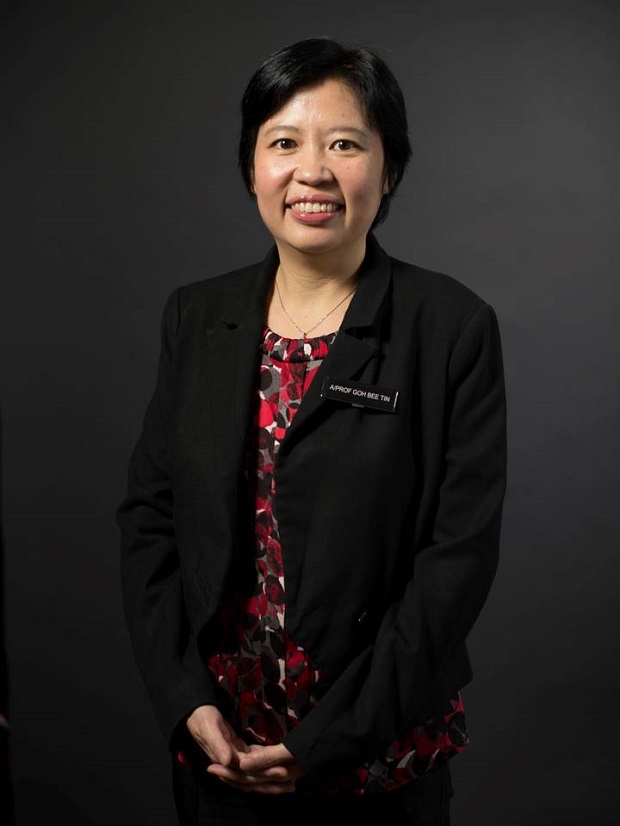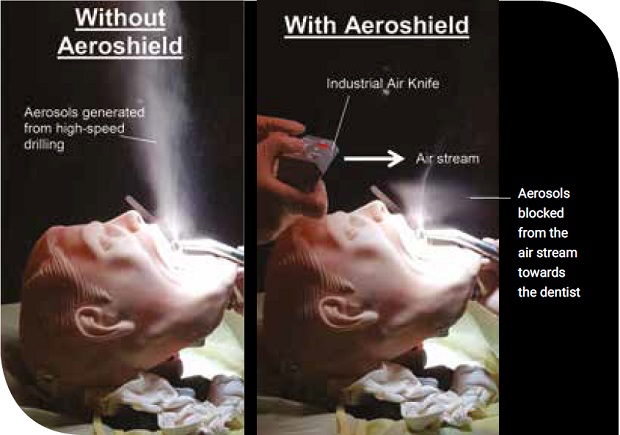A device developed by the National Dental Research Institute Singapore provides protection from infection during treatment.
Dental procedures, such as scaling and polishing, invariably generate aerosols — a mixture of water from dental equipment, the patient’s blood and saliva. Aerosol exposure occurs most commonly on the dental professionals’ faces and clothes, as well as the nasal area of the patient.
Dentists, especially, are at a high risk of getting infected with COVID-19 and other diseases through cross contamination because they work within close proximity to their patients’ mouths.
Research has shown that aerosols can travel as far as 1m horizontally and 0.5m vertically from a patient’s mouth. These aerosols can also remain in the air for up to 30 minutes after dental scaling, which can potentially expose the next patient to cross-infection.
When the aerosols settle on surfaces surrounding the treatment area, it can increase the risks of infection. The COVID-19 virus, for instance, has been known to stay on surfaces such as metal, glass or plastic for a few days.
To provide a safer setting for dentists and patients, a team from the National Dental Research Institute Singapore (NDRIS) developed Aeroshield, a device that uses air curtains as a barrier to prevent aerosols from splattering onto dental professionals. NDRIS was established in 2019 by the National Dental Centre Singapore (NDCS) as part of the SingHealth Duke-NUS Academic Medical Centre to meet oral health priorities in Singapore and globally.
“During the ‘circuit breaker’ period in 2020, patient attendances fell by 35 to 60 per cent, as dentists could only tend to emergency cases. Even with the gradual resumption of dental services later, many patients delayed their visits for fear of contracting COVID-19. These delays may result in deterioration of dental disease, and consequently, more complex and costly treatment,” said Clinical Associate Professor Goh Bee Tin (pictured), Principal Investigator of the Aeroshield project and Director of NDRIS.

“As Aeroshield significantly reduces the amount of aerosol contamination, it will also protect against other diseases that spread via droplets. Patients can access dental care with greater assurance, and dentists can continue to treat patients safely and effectively beyond the pandemic.”
A safe setting
In May 2020, Clin Assoc Prof Goh and her team began working on the idea of a biosafety air curtain in a dental setting.
They were inspired by the air curtains commonly installed in shopping malls and supermarkets. These invisible barriers effectively separate two environments on either side of the curtain to maintain a cool temperature in the mall while keeping dust particles out.
Similarly, Aeroshield uses air curtains that are directed as air jets to create a barrier over the patient’s mouth, thereby preventing aerosols from reaching the dentist and dental assistant.
The aerosols generated at the patient’s mouth are redirected by the air curtain and removed by a high-volume evacuator, which is used in routine dental practice. Aeroshield can be attached to a dental chair and an air compressor unit without any changes to the clinic’s infrastructure.

After every dental procedure, a wipe-down will be done to disinfect the room, which is part of existing infection prevention and control measures.
The team found that the use of Aeroshield reduced aerosol spread by close to five times, especially on the dentist’s and assistant’s face shields.
Read more: Electric toothbrush vs normal toothbrush, is one better than the other? Click here to find out.
Future plans
Having designed a prototype for Aeroshield, Clin Assoc Prof Goh and her team are now working with the Agency for Science, Technology and Research (A*STAR) to refine its shape, so as to improve its efficacy.
The team will be piloting Aeroshield on five chairs in NDCS this year, with the potential of rolling it out to the rest of the Centre and other collaborating clinics, such as SingHealth Polyclinics.
“When commercialised, Aeroshield will be the first device that uses the air-curtain technology to prevent cross-infection in dental clinics. It is practical and easy to set up without causing any discomfort to the dentists and patients, and does not intrude into the dentists’ work space since there is no physical barrier,” said Clin Assoc Prof Goh.
There are also plans to extend this technology to other specialties such as Anaesthesiology, Otorhinolaryngology and Ophthalmology, as medical professionals in these fields are also at risk of exposure to aerosols.
Get the latest updates about Singapore Health in your mailbox! Click here to subscribe.
Tags:
;
;
;
;
News Article;
;
National Dental Centre Singapore;SingHealth;
;
Singapore Health;
;
;
;
;
Singapore Health
